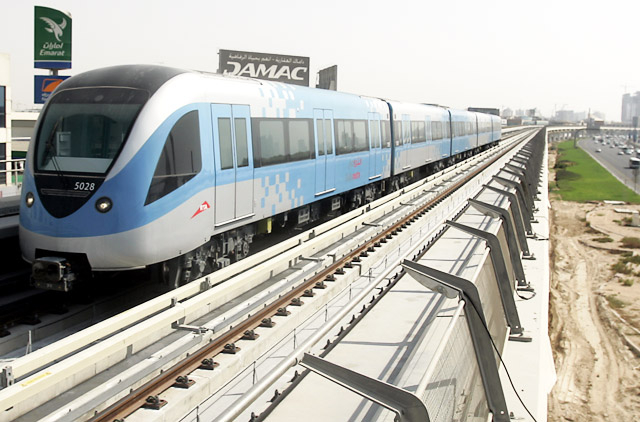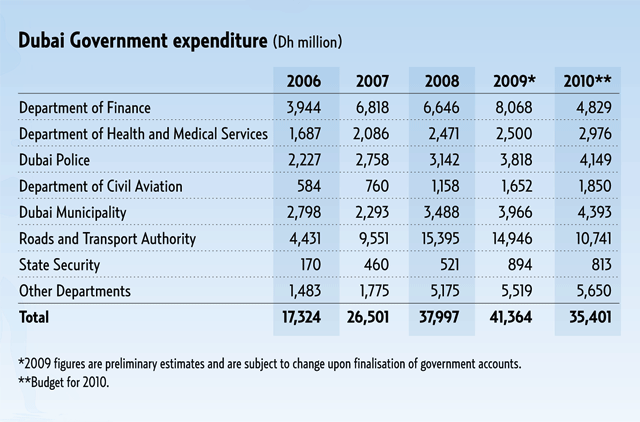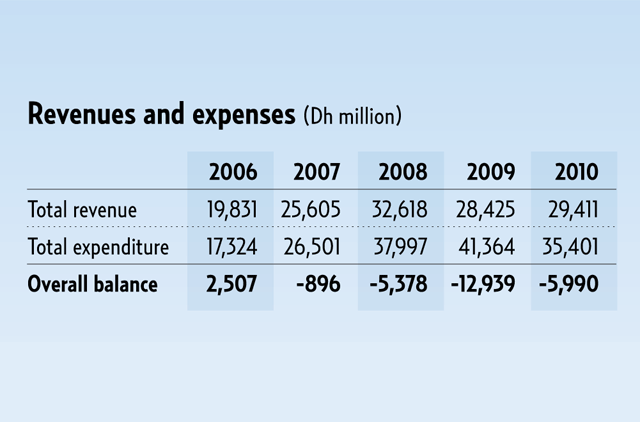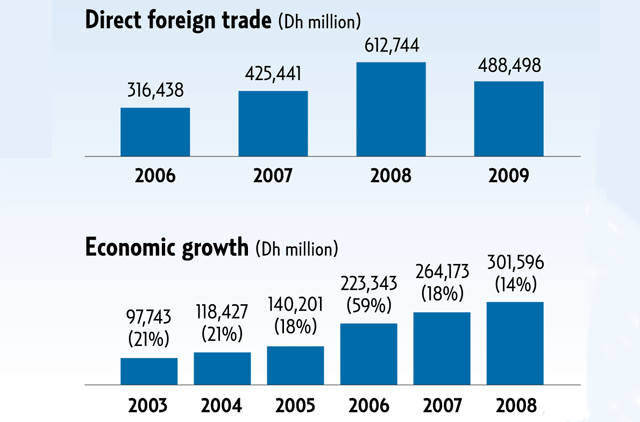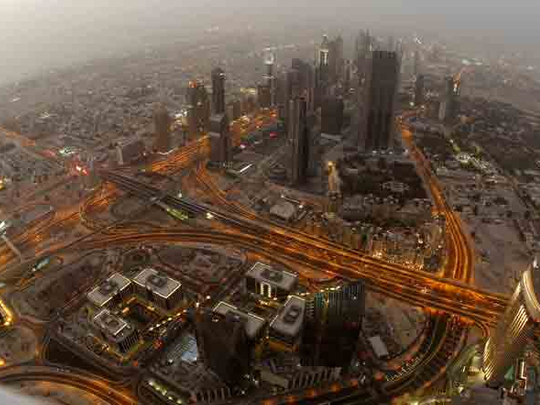
Dubai: The Dubai government is reviewing its growth strategy to focus on traditional strengths, such as trade, retail and tourism, in the aftermath of the global financial crisis which hit the local real estate sector.
More than half the 980 projects registered with Dubai's Real Estate Regulatory Agency (Rera) have been either cancelled or are in the process of being cancelled, according to a supplementary prospectus — considered to be refreshingly transparent — filed by Dubai's Department of Finance to the London Stock Exchange for a new bond issue.
The prospectus says the 2007 set of principles that comprise the Dubai Strategic Plan 2015 (DSP 2015) is being re-assessed. The original focus of the plan was on the core areas of economic development; social development; security, justice and safety; infrastructure, land and development; and government excellence.
On Monday, the government said it is reconsidering the "economic development" component of the plan, while other areas remain unchanged.
"The global economic crisis has significantly impacted the Dubai Government's economic development plans and, as a result, the government is currently re-assessing the stated aims of the DSP 2015," the prospectus says.
The aggregate direct debt of the Dubai Government was Dh105.47 billion as at July 31, 2010, the prospectus shows. In May this year, the government of Dubai announced plans to set up a debt management office (DMO) in line with similar steps being taken at the federal UAE level.
"Once formed, the purpose of the DMO will be to centralise decision-making related to the issuance of debt by the government of Dubai," the prospectus says.
The statement by His Highness Shaikh Mohammad Bin Rashid Al Maktoum, Vice-President and Prime Minister of the UAE and Ruler of Dubai, that Dubai "is back" highlights the speed and efficacy with which the emirate has responded to challenges on multiple economic fronts.
"Dubai's reassessment of targeted strategic sectors requires an integrated evaluation of global trends, local capabilities, and the domestic economic landscape," said Dr Armen V. Papazian, financial economist and chief executive of Keipr, a boutique consultancy that specialises in business analytics and intelligence.
"The choice must be based not just on past or existing strengths. Strengths can be built and developed. It is also crucial to assess the foreign exchange earning potential of the sectors, industries, and businesses that Dubai chooses to focus on."
New focus
The DSP 2015 originally envisaged future economic growth coming from six sectors: travel and tourism; financial services; professional services; transport and logistics; trade and storage; and construction. These sectors were identified based on their international competitiveness at the time, Dubai's capacity to develop them and the availability of necessary enabling factors.
The re-assessment currently under way focuses on sectors where Dubai has traditionally been strong - the wholesale and retail sector (international and domestic trade); transport and storage; and the tourism and manufacturing sectors.
In addition, the DSP 2015 has identified seven enabling factors that need to be developed in parallel: human capital; productivity; science, technology and innovation; the cost of living and doing business; quality of life; economic policy and institutional framework; and laws and regulations.
"The strategy is responding to the reality that we're in a different evolutionary phase as the market matures," said Blair Hagkull, chairman of Jones Lang LaSalle MENA.
Dubai's nominal GDP grew by 18.3 per cent in 2007 and by a further 14.2 per cent in 2008, reaching Dh301.6 billion in 2008. Dubai's nominal GDP per capita in 2008 was approximately $50,000, based on an assumed population of 1.65 million.
The nominal GDP in 2008 was 32.3 per cent of UAE's. In 2006 and 2007, the equivalent proportions were 34.7 and 34.9 per cent, respectively. No official estimates of Dubai's nominal GDP for 2009 are yet available.
Data published by the UAE National Bureau of Statistics has estimated that nominal GDP in the UAE for 2009 was Dh914.3 billion, a decline of approximately 2.1 per cent over 2008, reflecting the adverse effects of the global economic crisis and the drop in oil prices during 2009.
Provisional data published by the International Monetary Fund has estimated that the UAE's nominal GDP for 2009 was Dh846 billion, a decline of 11.9 per cent over 2008.
Dubai's oil and gas revenues dropped 25 per cent between 2006 and 2009, and are set to fall further in 2010, the prospectus says, due to lower oil prices and rising expenditure.
Oil and gas revenues are budgeted to reach Dh2.8 billion in 2010, down from an estimated Dh4.7 billion in 2009, Dh8.5 billion in 2008 and Dh6.3 billion in 2006.
"Oil and gas revenues — which are included in the budget net of related oil and gas expenditure - in 2010 are expected to further decline as compared to 2009 revenues due to greater oil and gas related capital expenditures," the document says.
The number of new businesses registered by Dubai's Department of Economic Development (DED) fell from 15,014 in 2008 to 11,644 in 2009.
Licences issued by the DED are classifiable as commercial, professional or industrial enterprises, depending upon the activity to be undertaken. Only the professional category witnessed an increase in the number of licences issued over the two years.
"The banking sector should come forward and support small and medium sized businesses as Dubai's economy relies heavily on trade, services and finance," said Jitendra Gianchandani, chairman of business consultancy JCA International.
"Due to the global crisis, finance facilities for SMEs almost dried up in 2009. Also, fees for trade licences and visas could be re-assessed to attract new business to the emirate. Some of the stringent rules — such as a minimum office size — could also be eased."
Infrastructure plans
Infrastructure continues to be one of the focus investment areas for Dubai. The Roads and Transport Authority (RTA) has developed a comprehensive roadmap to integrate roads, highways, rail and marine transport within the emirate.
The RTA's strategic plan identifies a number of strategic goals to be achieved between 2009 and 2013, including the provision of a multi-modal integrated transport system.
Since 2005, the RTA has overseen the construction of the Dubai Metro and a number of other major bridge and road improvement projects. A significant proportion of Dubai's development expenditure in the period since 2005 has been spent on transport projects, including the Metro, which cost Dh29.6 billion.
Approximately Dh20 billion of that has already been paid. Of the remainder, Dh3.77 billion is being paid by the RTA to the Dubai Rail Link Consortium in monthly instalments of Dh169 million between May 2010 and September 2011. The balance of Dh5.82 billion will be paid in equal monthly instalments over seven years.


